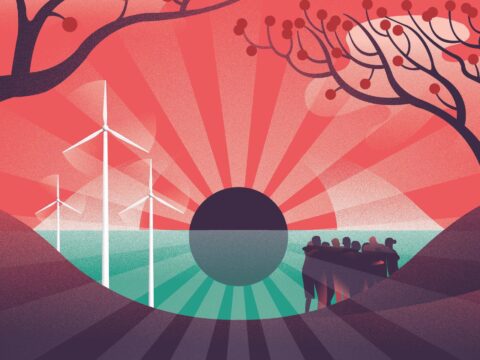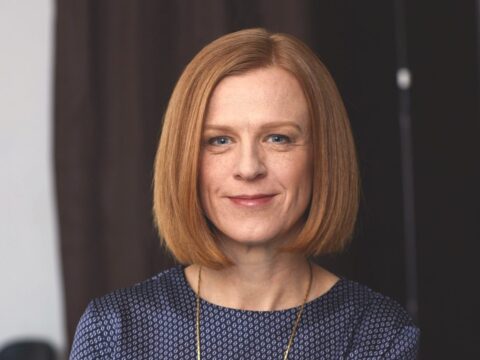Tomson Highway has never been one to be confined by expectations. The 70-year-old Cree author, playwright, pianist and songwriter is best known for his comedic plays and genre-spanning books which explore the residential school system, life on reserve and Indigenous culture. In May, Highway received the Governor General’s Performing Arts Award for Lifetime Artistic Achievement.
Highway is set to travel across Canada this month to deliver his CBC Massey Lectures, Laughing with the Trickster: On Sex, Death and Accordions. Comparing Christian, ancient Greek and Indigenous mythologies, the lectures delve into the five themes of language, creation, sex and gender, humour, and death. Laughing with the Trickster will be released as a book on Sept. 27 and lectures will be broadcast on CBC Radio’s IDEAS beginning in November. Highway spoke to Tobin Ng.
You may unsubscribe from any of our newsletters at any time.
Tobin Ng: What does it mean for you to be delivering the Massey Lectures?
Tomson Highway: I looked at the list of people who have done the Massey Lectures in the past, and I respect and admire their intelligence. To be added to the list is a great honour — that means that somebody thinks I’m smart. All these years I thought I was stupid, but that’s not the case!
TN: One thing you were very intentional about was weaving Cree words into your lectures. Why was that important to you?
TH: It’s my native tongue. Over the past few years, English has become my third language. I’m not comfortable with the language — it doesn’t work for me, the way my brain works. Cree is the language that I’m most familiar with.
See how I’m talking very seriously right now? If we were talking in Cree, we would be laughing from the very first syllable. It’s a laughing language, it’s a joyful language — and my favourite activity in the world is to laugh.
When you speak Cree, you laugh hysterically at the most ordinary and boring things. I was just playing with a word today — kayâs. Kayâs means a long time ago. It depends on how long ago it was that you’re talking about — the longer a time ago, the longer the last syllable. So if you’re describing an event that happened 100 years ago, by that time, you’ve arrived at a very long second “a.” A quick kayâs (kai-YAS) is last week. Kayâs (kai-YAAAS) is last year. But if it’s a hundred years ago, you go, KAYÂS (KAI-YAAAAAAS)! See? You’re already smiling. Your face changes, your emotions change and you begin to laugh — and not just laugh ordinarily, but laugh hysterically. The second you switch to English, that laughter stops. I find that kind of disturbing, quite frankly.
TN: In the first lecture, you talk about how processes of colonialism have suppressed language. What can be done to preserve Indigenous languages?
TH: Writing them. I write books and song lyrics in them. I’m a musician and a trained concert pianist — my career straddles the world of publishing and the world of music.
That’s one way of doing it — writing in it and writing music in it, writing songs that are so catchy that people who don’t speak Cree will start singing in the language. Just like you start singing with Brazilian Portuguese, when you listen to a very, very hot Brazilian samba. You don’t even think about it. It’s an unconscious process. That’s what I hope to do, and that’s my contribution to the preservation of the language — making it not only a laughing language, but a singing language.
WATCH: This Cree speaker and healer is passionate about preserving his language
TN: Myths are a central part of your lectures. What can we learn from them at this moment?
TH: Certain languages were given creation stories. We’re given a planet as a gift, and then we’re evicted. We’re given the gift of a garden, which ultimately is the planet and the human body, the human body being the most fabulous garden that was ever invented — the garden of beauty, the garden of pleasure, the garden of joy. Those languages impress on you that because of the act of a woman who engaged in an act of pleasure, namely the eating of an apple, mankind was evicted from that garden.
Other languages just don’t function like that. In other languages, planet Earth is a garden. We are still in it. In order to understand that concept, we have to speak those languages that contain that idea — because that idea, in English, for instance, is shocking. Enjoying the human body is not a sin? I’m sorry, but to me, it isn’t. Then they have very elaborate descriptions of where you will go when you die if you enjoy your body too much on this planet, which is to hell. You will suffer for eternity for having enjoyed your garden. Those kinds of concepts start opening out and you start having very interesting conversations.
TN: What’s the difference between myths and stories?
TH: There are always three levels of storytelling. In Cree, we have a fabulous way of explaining it because there are actual words that describe it. There’s aachi-moowin, which means to tell the truth, to tell a story that is true. Then, on the other side, there’s kithaas-kiwin, which means to tell a lie, to tell a story that is not true. Then exactly halfway between those two is achi-thoogee-win, which means to mythologize. Stories tell the truth, lies tell the untruth and mythology combines the two. That’s where we find stories of men and women with wings, women born from the sea, seas divided in half so men can walk across, snakes who talk, dead men who rise from the grave. I’ve never heard a snake talk — but in mythology, they do.
Another difference is that a myth is a story that your intellect cannot believe. You cannot tell me that a snake talks, unless, of course, you’ve met one. Your intellect can’t believe that a woman can give birth without having had sex, which is central to Christian mythology. Your intellect can’t believe that, but your spirit believes it completely.
More on Broadview:
- ‘Hallelujah’ and Leonard Cohen’s personal mythology of betrayal and forgiveness
- Halal Bae wants to shift perceptions of what drag can be
- How Indigenous influencers are celebrating their cultures on social media
TN: What’s the power of mythology as this midway point between fact and fiction?
TH: I say in my book that the idea of God is ultimately unexplainable. There is no language on Earth that can explain adequately how the universe and planet Earth came into being, and how the first human was made. So humanity had to invent a new language to explain the immensity of these ideas — that language is mythology. According to those myths, a male God came out of nowhere and created life on Earth in six days. He created man on the sixth day, and then he forgot to create woman. He created her as an afterthought, from the rib bone of man. To this very day, a woman is nothing but the rib bone of her husband — which is not the truth.
In a matriarchal system, it should be the other way around. The female God created woman first, and man as an afterthought, the result being that a man is the rib bone of his wife. That is to say, the insult goes the other way. [The biblical account of creation] is an insulting and abusive story. And not only is it abusive to women and two-spirits, but it is abusive to the land, to the environment. That’s the importance of mythology, and that’s why I wrote this book — to put my voice on the debating table.
TN: Another theme you speak about in the lectures is Trickster stories. How do they speak to the resilience of Indigenous authors?
TH: Every mythology has a central hero figure, who is usually half-divine and half-human. The central hero in Cree mythology is a clown. Some languages are such that God put us on this Earth to suffer — the more you suffer in this life, the more likely you are to perhaps be deserving of happiness in the hereafter. In other languages, the reason for existence on planet Earth is not to wallow in guilt and apologize for something we didn’t do, but to laugh. That’s why we were put on this planet. That’s why the Trickster stories are so important — they make us laugh.
TN: Why do we need laughter in this particular moment?
TH: Laughter makes you want to live. It instils in you a desire to celebrate life. Laughter is my favourite sound in the world. Every time I open my mouth, a joke comes out. It’s a talent that my father had. It’s just automatic now — I’ve been trained in it for so long. The sound of human laughter to me is like listening to a symphony. When you switch to English, that laughter stops, and you’re once more back outside the garden. In one language, you’re inside the garden, and in other languages, you’re outside the garden — so take your pick. Do you want to suffer, or do you want to laugh?
***
Tobin Ng is a writer in Ottawa.













